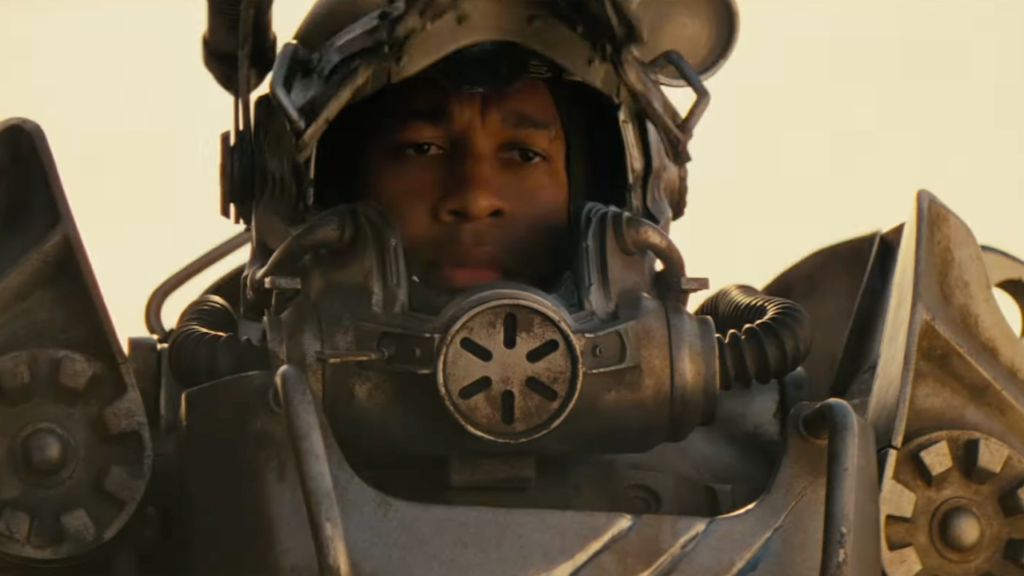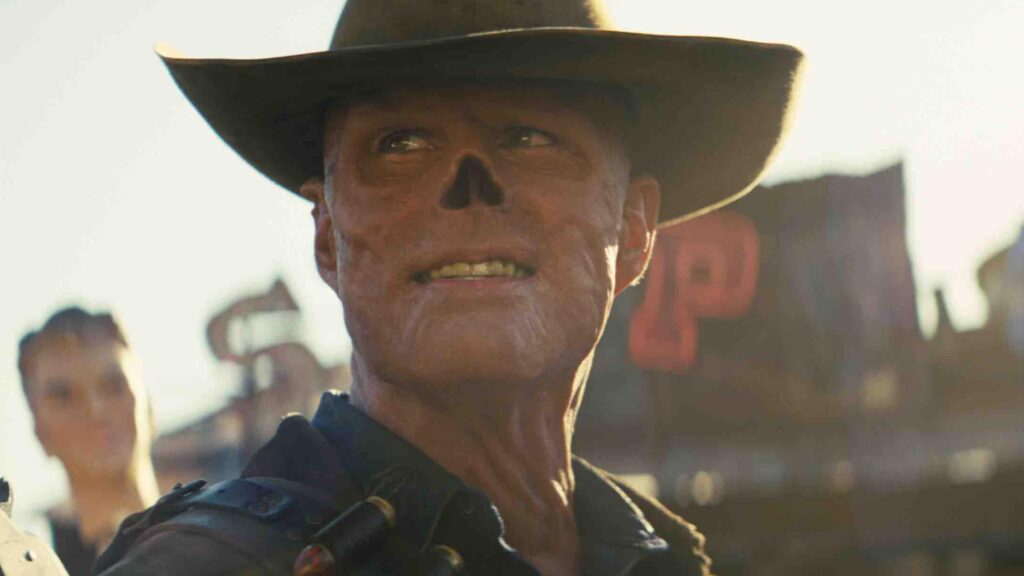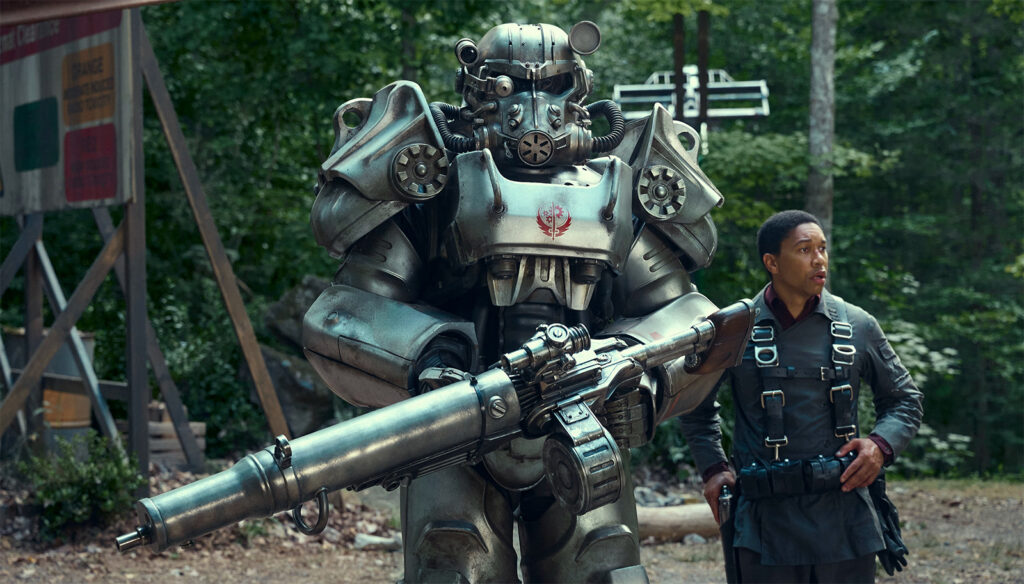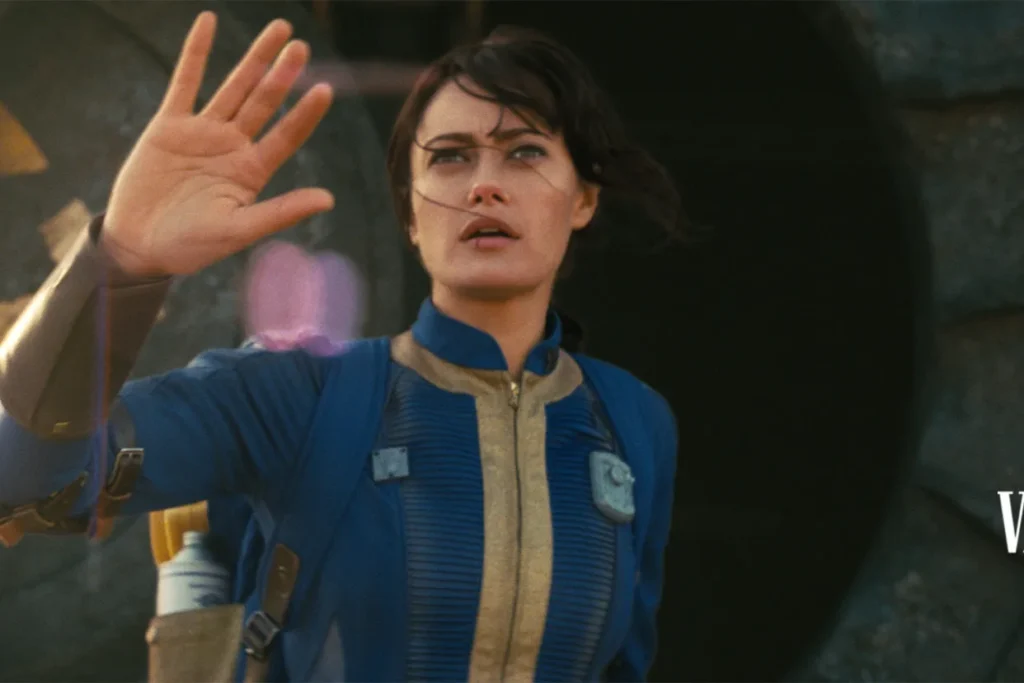Amazon’s “Fallout,” inspired by the popular video game series, offers a thrilling glimpse into a world ravaged by nuclear disaster. Combining elements from “Westworld” and “The Boys,” this series presents a dark and gritty vision of survival in a dystopian future where humanity’s morals are put to the test. It’s a captivating adventure that explores the challenges faced by society after a devastating nuclear strike.

Lucy, portrayed by Ella Purnell, ventures out from the safety of her underground vault, where she has spent her entire life. She’s a young and idealistic schoolteacher, specializing in American History with an emphasis on ethics. However, her first moments outside the vault quickly shatter her naive expectations of the world above. Almost immediately, she encounters a massive cockroach, resembling the size of an adult corgi, that threatens her safety.
Just when it seems Lucy might be in real danger, a German Shepherd emerges from the shadows and comes to her rescue. The dog attacks and devours the mutant insect, saving Lucy from harm. This encounter serves as a stark reminder of Lucy’s vulnerability in this hostile environment.
Having lived in a society governed by strict rules, common goals, and good manners underground, Lucy finds herself ill-prepared for the chaos and lawlessness of the desert wasteland outside. While her bright blue jumpsuit provides some protection against radiation, it offers no defense against the myriad dangers and parasites lurking in the shadows, waiting for an opportunity to strike. Lucy’s journey is just beginning, and she must quickly adapt to survive in this unforgiving post-apocalyptic world.

Lucy faces a crucial decision, prompted by the dog’s owner who observes her near-fatal encounter with the giant cockroach. He warns Lucy that if she chooses to stay on the surface, she’ll need to adapt to survive. He poses a thought-provoking question: as she transforms to fit this harsh environment, will she still hold onto her original values and desires?
“Fallout” continually challenges its characters with this dilemma, emphasizing the harsh reality that kindness and innocence may not be enough to survive in a post-apocalyptic world. The series shares thematic similarities with “The Last of Us,” exploring the human drive to persevere amid the darkest aspects of society.
Drawing inspiration from shows like “Westworld” and “The Boys,” “Fallout” unfolds as an eight-episode adventure filled with mysteries and dark humor. The series doesn’t shy away from provocative topics, including anti-capitalism themes introduced in the latter half of the season. While these elements give the show contemporary relevance, they sometimes lack depth, offering more style than substance.
At its core, “Fallout” is an action-packed spectacle designed to captivate its audience with thrilling sequences and intricate world-building. However, beneath its polished surface lies a pervasive cynicism that challenges viewers’ optimism. Whether you appreciate the show’s slick presentation or find its bleak outlook unsettling, “Fallout” offers a compelling exploration of survival in a world where morality is often compromised.

Lucy, played by Ella Purnell, is a young schoolteacher who has spent her entire life in an underground vault, shielded from the dangers of the outside world. Specializing in American History with a focus on ethics, Lucy finds herself unprepared when she ventures into the post-apocalyptic wasteland and is attacked by a massive cockroach. Fortunately, a German Shepherd saves her from the creature, highlighting her vulnerability in this new environment.
As Lucy navigates this dangerous world, she faces a crucial decision presented by the dog’s owner. He warns her that if she chooses to remain on the surface, she’ll need to adapt and possibly change her values and desires to survive. This dilemma is central to “Fallout,” which repeatedly challenges its characters to confront the harsh realities of a cruel and lawless world.
Inspired by the video game series and sharing thematic similarities with “The Last of Us,” “Fallout” delves into the human instinct to survive despite experiencing the worst aspects of humanity. However, the series also incorporates elements reminiscent of “Westworld” and “The Boys,” featuring puzzles, dark humor, and an anti-capitalism message.
Lucy’s story arc unfolds as one of the three main narratives in “Fallout.” Living in the vaults, she is part of a community that has survived underground for generations. Her father, Hank (played by Kyle MacLachlan), serves as the Overseer, a position of leadership in the vault. While the community works together to sustain their way of life, Lucy’s next assignment involves marriage, as her children are expected to be the first generation to venture to the surface and repopulate the planet.
Monty (played by Cameron Cowperthwaite) is chosen as Lucy’s husband from another vault through a trade arrangement. Despite their seemingly idyllic wedding in a cornfield, enhanced by projectors to simulate a beautiful summer evening, complications arise once the vault doors open.
In the world of “Fallout,” opening up to others, both emotionally and physically, proves to be a perilous endeavor. As Lucy’s story unfolds, viewers are invited to explore the dangers of trust, the challenges of adaptation, and the complexities of human nature in a world where survival often requires sacrifices and compromises.

After a series of events that shift the dynamics of the show, Lucy finds herself alone, facing a difficult choice. She must decide whether to toughen up to protect herself or to remain true to her compassionate nature, hoping others will treat her kindly.
Enter Maximus, the second lead character played by Aaron Moten. Raised on the surface wasteland and trained by the Brotherhood of Steel, a military group led by armored “knights,” Maximus is disciplined but also carries an oversized ego and a chip on his shoulder. Despite his average height, he has faced ridicule and mistreatment from his superiors, leading to deep-seated jealousy and resentment.

Maximus, portrayed by Aaron Moten, presents one of the more challenging aspects of “Fallout.” His character’s evolution from villain to hero feels unearned, and his journey is filled with implausible conveniences. Despite frequent beatings in this brutal world, Maximus always manages to survive, raising questions about his seemingly charmed existence.
In contrast, the third main character, played by Walton Goggins, injects the series with undeniable charisma. Known as the Ghoul, he is a partially deceased bounty hunter tasked with retrieving a valuable item that brings our protagonists together. Goggins’ character provides a link to the pre-apocalyptic era, where he was once a famous movie cowboy named Cooper Howard. The mystery of his downfall and its connection to society’s collapse is intriguingly teased throughout the season, culminating in a satisfying reveal in the finale.
Under the direction of Jonathan Nolan for the first three episodes, “Fallout” successfully merges classic Western aesthetics with futuristic elements. The vaults feel intricate and lived-in, while the expansive desert is portrayed as both inviting and perilous. While I haven’t played the video games, the series’ visual style, pacing, and structure appear to be well-executed.
However, “Fallout” suffers from repetitive storytelling, which hampers its overall impact. Despite its strong visuals and compelling characters, the series struggles to maintain freshness and innovation, leading to a somewhat monotonous viewing experience.

Maximus, played by Aaron Moten, stands out as a challenging character in “Fallout.” His transformation from a villain to a hero feels rushed and unconvincing, and his storyline is filled with convenient plot twists. Despite facing numerous threats and beatings in the harsh post-apocalyptic world, Maximus always survives, which strains believability.
On the other hand, Walton Goggins’ character, the Ghoul, adds a captivating presence to the show. As a partially undead bounty hunter, he’s on a mission to retrieve a valuable item that brings the main characters together. Previously known as Cooper Howard, a famous movie cowboy in the pre-apocalyptic era, the Ghoul’s backstory and connection to the downfall of society add depth to the narrative. The mystery surrounding his past is intriguingly revealed throughout the season, leading to a satisfying conclusion in the finale.
Directed by Jonathan Nolan for the initial three episodes, “Fallout” combines classic Western themes with futuristic elements seamlessly. The show’s visuals are impressive, with detailed and immersive settings like the intricate vaults and the vast, dangerous desert.
While I haven’t played the video games that inspired the series, the visual style, pacing, and overall structure of “Fallout” appear to be well-crafted. However, the show’s repetitive storytelling becomes a drawback, diminishing its impact and making the viewing experience somewhat monotonous. Despite its strong characters and visuals, “Fallout” struggles to maintain momentum, resulting in a series that feels repetitive at times.
